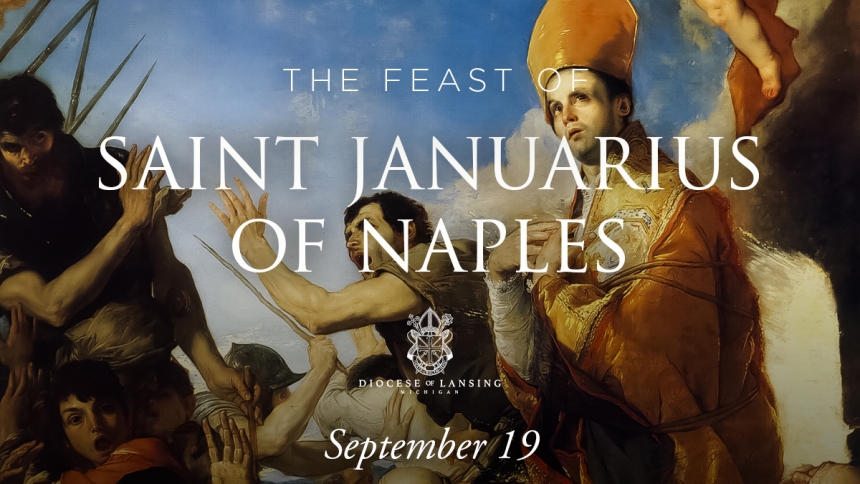
Buona festa! Happy feast day! Today all Italy, and beyond, celebrates the Feast of Saint Januarius of Naples. Who? Read on as Kishore Jayabalan now explains.
Kishore is the chairman of the Diocese of Lansing’s Commission on Catholic Social Teaching. A native of Flint, he lived in Italy for 20 years where he worked for the Vatican. Kishore writes:
Saint Januarius was the Bishop of Benevento and a martyr who died in the year 305 AD under the persecutions of the Roman emperor, Diocletian.
San Gennaro, as he’s known in Italian, is one of the patron saints of Naples, where the relic of his blood mysteriously liquefies, usually three times a year: the Saturday before the first Sunday of May, his feast day of September 19, and December 16, the anniversary of the 1631 volcanic eruption of Mount Vesuvius, when the relic apparently saved the city from destruction. The blood also liquefied on March 21, 2015 during a visit of Pope Francis; the last time this happened in the presence of a pope was when Pius IX visited in 1848.
While they may appear superstitious to secular rationalists, the veneration of relics and other forms of popular piety are often lacking in our society. “The Catholic wisdom of the people is capable of fashioning a vital synthesis…It creatively combines the divine and the human, Christ and Mary, spirit and body, communion and institution, person and community, faith and homeland, intelligence and emotion.” (Catechism of the Catholic Church, n. 1676) This is certainly the case in Naples, which once had more than 50 patron saints and still has a civic pact with the treasury of San Gennaro signed in 1527. Our faith is too rich to be restricted to worshiping in Church an hour per week and must express itself in other ways.
The Church’s liturgy remains superior to popular piety, so the best way to honor San Gennaro is by attending Mass and receiving the Body of Christ in a worthy manner. That should not stop us from celebrating in other ways as well, perhaps with some pizza, “Neapolitan” ice cream, babà, or limoncello, and, in the company of others, the more the merrier. Of course, these and other worldly goods are not ends in themselves; they must prepare us to live and die for Christ, as San Gennaro did.
